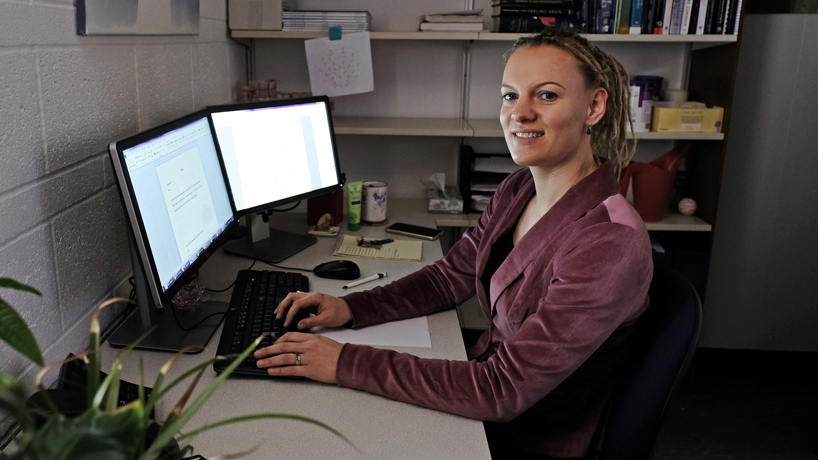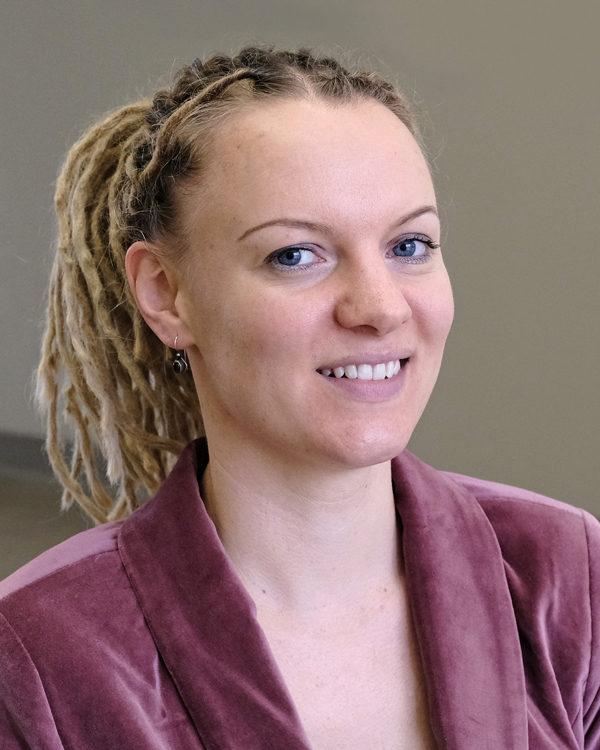
Psychology Professor Sandra Langeslag, who is originally from Holland, came to UMSL in 2014. She runs the Neurocognition of Emotion and Motivation lab on campus, where she guides both undergraduate and graduate students through research pursuits that focus largely on cognition’s relationship to love. (Photos by August Jennewein)
When University of Missouri–St. Louis psychology faculty member Sandra Langeslag tells people that she researches love, the reactions she gets are mixed.
Students immediately lean in. Fellow professors, researchers and even small-talking strangers are intrigued.
Journal editors are contradictory. Funding providers can be skeptical.
“I get totally polarized responses,” Langeslag says with a smile from her fourth-floor office in Stadler Hall. “People either love it or they hate it and think I’m crazy.”
Why such strong responses?
Everybody has something to say – and plenty of preconceived notions – about the nearly universal experience of love.
And now everyone has something to say about the professor of psychology’s research.
A study she published in August in conjunction with Erasmus University Rotterdam’s Jan Van Strien has caught the eye of several news and media publications including The Wall Street Journal, The Huffington Post Canada, Cosmopolitan UK and more.
Put very briefly, the study investigates the concept of love regulation by looking at how cognition affects love. In other words, it asks: Can a person change how in love they are just by thinking? Can thinking positive thoughts about one’s beloved (he’s so smart, kind and good) make positive feelings of love increase? And likewise: Can thinking negative thoughts (she’s always messy, we have no future together) make love feelings decrease?
The data Langeslag has collected, a combination of measurable participant responses and brainwave analysis, points to an affirmative answer to all of these questions.
Yes. Love – a feeling many people say they simply can’t control – might just be controllable after all.
Why is this so exciting?

Is love an emotion? Langeslag says no. “The main reason for that is that when you are in love that can elicit different emotions depending on the situation. If you love someone and they love you back, it makes you very happy. If you love someone and they don’t love you back, now it makes you very sad. This idea that love elicits different emotions depending on the situation tells me that love itself cannot be an emotion. Instead, I call it a motivation or drive, sort of like hunger or thirst.”
There are several instances in life when being able to change one’s feelings of love might be useful and even beneficial for emotional health and well-being.
“Imagine if you love someone who doesn’t love you back,” Langeslag offers as one example. “Or maybe you are happily married and now you develop this crush on someone else, but you don’t want to develop this crush because your marriage is good.”
The opposite can be true as well.
“There are also situations where people may be less in love than they want to be,” she further explains. “We know that in long-term relationships love feelings can decline over time, and that can cause breakups or divorces where people say things like, ‘We don’t hate each other and no one cheated, but we’re just not in love anymore.’”
Langeslag clarifies that while the results are definitely intriguing, they aren’t as simple as they may first seem.
“It’s not like we have an on or off switch and you think about negative things and now you’re not in love at all anymore.”
The effects, she says, at least in this initial study, appear to be smaller and more temporary than that. But what if they weren’t?
Here at UMSL, through her Neurocognition of Emotion and Motivation Lab, Langeslag and her students are busy investigating that question and many more.
They examine how love improves cognition.
“In my previous work,” Langeslag explains, “I’ve shown that people have more attention for any information that has to do with their beloved. For example, if your beloved is a fan of Brad Pitt, now you will notice movie posters with Brad Pitt on them even though you don’t care about Brad Pitt. People remember stuff that has to do with their beloved more than with someone else.”
And they study the reverse – how love harms cognition.
“Think of people who say, ‘I just can’t focus on my work or my homework. I’m thinking about this person all of the time,’” Langeslag says. “Does that increased cognition about things that have to do with one’s beloved come at a cost? Does it make you worse at tasks you should be doing?”
The potential real-world application of such inquiries is part of what encouraged Langeslag to make love her main research focus in the first place, back when she was an undergraduate student herself.
Indeed, it’s also part of what drew her to her field of biopsychology – a specialty area under the broader banner of psychology in which biology – hormones, chemicals, neurological processes and the like – inform and intersect with the study of human behavior.
It’s a discipline that many people don’t know exists.
In fact, Langeslag says she used to be one of those people.
She tells a story of going to another university’s version of UMSL Day, back before she started her undergraduate studies. Her friend was interested in psychology, and so she found herself surrounded by information about programs and options for study. She picked up a biopsychology book and things began to click.
“I was like, ‘Hold on. Is that a thing?’” she says with a laugh. “I went through this textbook and I realized it was about the brain, and hormones and everything, and I was like, ‘Well that’s it. That’s what I need to do.’”
Langeslag says that now, in the classes she teaches on human learning and memory and emotions and the brain, students are also excited by those same intersections, as well as the moments when research connects to lived experience.
“We discuss the research in class, and the studies often point to, ‘Oh yeah, I do that too,’ or, ‘Oh yeah, I feel that too,’” she says. “So it’s applicable. It’s meaningful in a tangible way. That’s exciting.”
Students who are interested in getting in on that excitement – and learning more about the science behind love – should note that Langeslag’s NEM lab is currently recruiting both researchers and participants for further studies. In fact, her lab members are organizing a scientific speed dating event at UMSL which will take place on Feb. 9. The event will share information about the lab and its research alongside opportunities for students to meet and mingle. For more information, send an email to nemlabpsychology@umsl.edu.
Media Coverage
The Wall Street Journal
The Huffington Post Canada
Cosmopolitan UK
St. Louis Public Radio
InBusiness.ae
Fortune
Medical Daily
Viva (Indonesia)
Independent
prima
Daily Mail
Your Tango
Times of India















